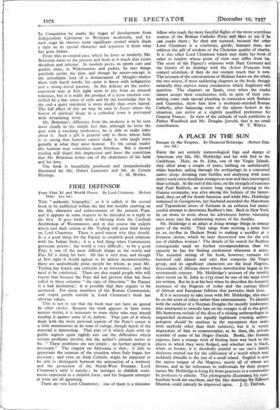A PLACE IN THE SUN FROM the not entirely meteorological
fogs and damps of American city life, Mr. Holdridge and his wife fled to the Caribbean. Here, on St. John, one of the Virgin Islands, they idled away a couple of years, bathing on unbelievably white beaches, sailing through the archipelago in a converted native sloop, drinking rum fuddles and analysing with scant mercy such extra-Antillean strangers as now and then interrupted their solitude. At the end of this time, On the strength of rumours that Paul Redfern, an aviator long reported missing in the Guiana savannahs, was alive among the Indians of the hinter- land, they set off for South America, and while Mrs. Holdridge remained in Georgetown, her husband ascended the Marowyne and Tapanahoni rivers of Surinam in an arduous but unsuc- cessful attempt to determine Redfern's fate. Back in New York, he sat down to write about his adventures before venturing once more into the exhilarating waters of the Antilles.
Mr. Holdridge is an adept at doing. strange things in strange parts of the world. They range from meeting a polar bear on an ice-floe in Hudson Strait to .making a sacrifice at a Javanese shrine, which he later discovered was for the sole use of childless women ! The -details of his search for Redfern consequently need no further recommendation than the capacity he has for finding excitement wherever it exists. The essential setting of his book, however, remains the hundred odd islands and cays that comprise the Virgin group, and its significant characters are the local Negroes, descendants of African slaves whose introduction began in the seventeenth century. Mr. Holdridge's account of the terrible slave revolt on St. John in 1733 must be one of the most vivid yet written. But he is at his best when he describes the leisurely existence of the Negroes of today and the curious blend of African and European folklore that pervades their lives.
If it is necessary to take issue with Mr. Holdridge, this must be on the score of ethics rather than entertainment. To-identify with the Candour of a Nortnan Douglas the rascally' innkeepers who attempted to swindle him. on his voyages is all to the good. His humorous recitals of the dicta of a visiting anthropologist in unguarded moments are equally legitimate (visiting anthro- pologists should be Cautious ' in- the encounters they make with anybody other than :their subjects), but it is surely ungracious of him to commercialise, as he does, the- private scandals of some of his _Negro friends. Books, like homing pigeons, have a strange trick of finding their way back to the places in which they were fledged, and whether one is black, white or brown, it is decidedly painful to see one's family skeletons trotted out for the edification of a world which may suddenly dwindle to the size of a small island. English is now the native tongue of the Negroes, nearly all of whom are literate, and in his references to individuals by their proper names Mr. Holdridge is being far from generous to a community he professes to admire. The photographs illustreting his rum. bustioiis book ire excellent; and the lirie drawings;43yE4hVard Shenton could scarcely be improved upon. J. C. TRivoR.






















































 Previous page
Previous page